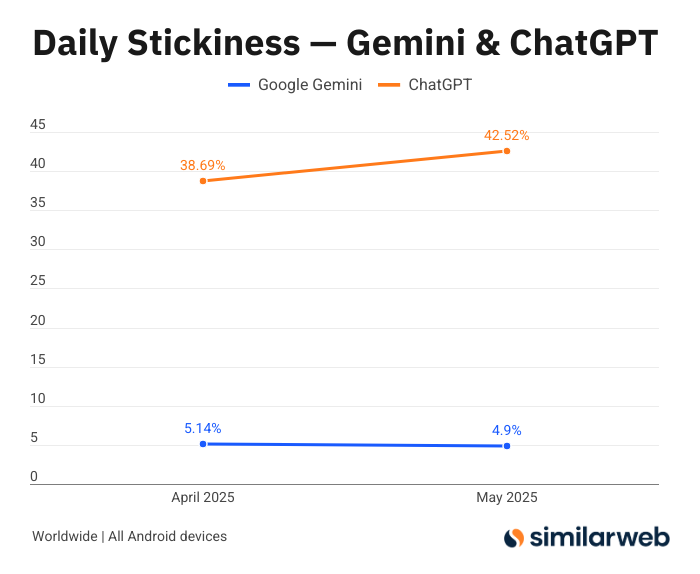Google might have been slow off the blocks in the AI race, but it’s making every effort to catch up.
New data from app intelligence firm SimilarWeb indicates that Google’s Gemini AI assistant saw a significant surge in app downloads in May 2025, overtaking OpenAI’s ChatGPT in this metric.

The chart tracking daily app downloads for Google Gemini and ChatGPT from April 1st to May 31st, 2025, reveals a dramatic shift in momentum. Throughout April, ChatGPT consistently maintained higher daily downloads, generally fluctuating between 2 million and 4 million, with some peaks exceeding 4 million early in the month. Google Gemini, meanwhile, saw more modest download numbers in April, often below 1 million, though with a gradual upward trend and a notable spike to around 2 million towards the end of the month.

May, however, marked a turning point. Gemini’s downloads began to climb steeply from the very start of the month, decisively crossing ChatGPT’s download numbers around May 7th. From that point, Gemini’s growth was explosive, reaching impressive peaks, including one spike close to 7 million daily downloads around May 23rd. In contrast, ChatGPT’s download numbers showed a general decline throughout May, often hovering around the 1 million to 1.5 million mark towards the end of the month. This surge suggests a successful marketing push, feature update, or increased user curiosity driving new installations for Gemini.
But while Gemini appears to have beaten ChatGPT in terms of daily downloads — from an admittedly lower base — it doesn’t yet seem to have the same kind of user retention that ChatGPT does. SimilarWeb also shared a chart on Daily Stickiness, which represents the ratio of daily active users to monthly active users, is a key indicator of how compelling an app is to its user base. Here, ChatGPT continues to maintain a significant lead. In April 2025, ChatGPT’s daily stickiness stood at a robust 38.69%, which further increased to an impressive 42.52% in May 2025. This indicates that a large and growing proportion of ChatGPT’s users are engaging with the app on a daily basis. Google Gemini’s figures, while showing massive download growth, tell a different story in terms of engagement. Its daily stickiness was 5.14% in April 2025 and saw a slight dip to 4.9% in May 2025. This disparity suggests that while Gemini is attracting a large number of new users, it is not yet retaining them or encouraging daily usage to the same extent as ChatGPT.

The data presents a fascinating snapshot of the current AI app landscape. Google Gemini’s surge in downloads is a testament to Google’s immense distribution power and brand recognition. Leveraging its vast ecosystem (Android, Play Store visibility, potential integration with Search and other services), Google can rapidly drive trial and adoption for new products like Gemini. The download numbers indicate a strong initial interest and a successful push into the market.
However, the stickiness figures are a crucial counterpoint. ChatGPT’s high and increasing stickiness underscores its strong product-market fit and the value users derive from its service. It has established itself as a go-to tool for a significant and engaged user base. This deep engagement translates into more data, more opportunities for refinement, and potentially a stronger moat against competitors.
For Google, the challenge ahead is clear: converting those millions of downloads into actively engaged users. Low stickiness could imply several things: users might be trying Gemini out of curiosity but not finding compelling daily use cases, or perhaps its features are not yet on par with user expectations set by competitors. It remains to be seen if Google’s Gemini can end up being as sticky as ChatGPT, but it’s taken the first step towards widespread adoption by at least getting its app into the hands of many new users.